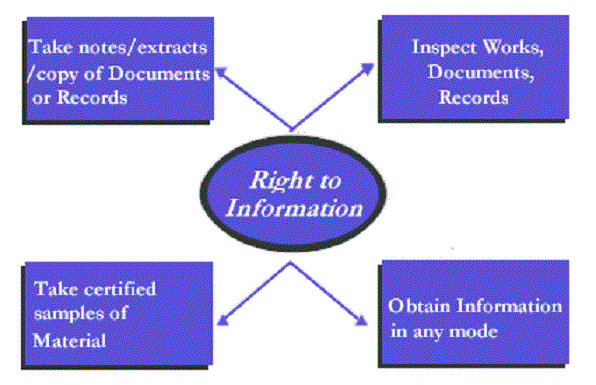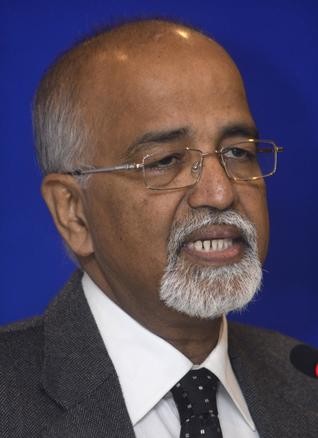
Democracy and the Citizens’ Right to Know
Democracy means that the people rule themselves. They elect their representatives and allow them to govern the country for a given period. The success of democracy greatly depends on two things:
First, honest and efficient persons, motivated by the spirit of public service, should offer their services to the people and the political parties should present such persons as their candidates during elections.
Second, the people should exercise their votes with great sense of responsibility and vote for the best candidate, without being misled by the considerations of religion, caste, language, region etc.
The results of elections reflect the trust placed upon the victorious candidates by the citizens and their approval of the policies and programs of those candidates highlighted in their manifestos. This means, that there should not be normally any problem in the forming of the government and running the administration for the specified period, say five years, by majority of the elected representatives.
Does this mean that once the elections are over, the citizens should leave everything to their representatives and simply accept whatever they do? What is the responsibility of the citizens while there is an elected government in position?
One extremity is the non-ruling parties try to impede all the programs of the ruling party. Their only intention is to create a bad name for the ruling party and dethrone it. So they would emotionalize the issues wherever possible giving political twists on the lines of religion, caste, language, region and what not. They would organize violent agitations and bandhs; and disrupt the day-to-day administration. They involve the students and laborers in frequent agitations, often funding them liberally, and create serious law and order problems. They provoke police and force them to take stern action; then they would complain about police atrocities. This type of antagonistic interventions by the non-ruling political parties not only makes the life of the general public miserable, but also reduces the standard of governance.
The other extreme would be the citizens being indifferent about how the government is run. Such politically dormant state of the citizens would also spoil the democracy in the long run. If the citizens are not vigilant about the public administration they would not be able to evaluate the performance of their representatives during their terms.
Both these extremities are bad; and could be avoided only by knowledgeable and alert citizens. If they understand the importance of good governance and see through the selfish motives of the political parties they can prevent the first extremity of mischievous agitations. The citizens can prevent the second extremity by discharging their watchdog function properly.
The citizens should be watchful about the functioning of their representatives to know whether they are really honest and efficient; whether they care to understand the problems of the people whom they represent and do what they can to solve them quickly; whether they work sincerely with the officials and try to reach the benefits of the various welfare schemes of the government to the people.
The citizens should closely observe the role of government and their representatives in providing good governance to the country and also keep themselves well-informed about all the areas of public administration. Then only they would be able to discharge their primary duty of electing good and competent persons to run the government for them in the next elections.
Even while the term of the government is ongoing, the people can take action for improving the administrative actions or stopping unfair or corrupt actions through appeals to the higher authorities or by filing cases in the relevant courts of law.
Apart from the matters personally related to them, the citizens should also take interest in the matters relating to the social affairs affecting the community interests. The matters like getting compensation to the victims of accidents in the locality, improper management of the schools or colleges in the neighborhood, improper handling of or failure to take proper action in a criminal case, undue delays in issuing a license, passport etc., neglect of a public utility project in the area – in such cases the citizens should be able to collect all the relevant information and present the case before the competent authority or court of law.
It is absolutely necessary that the citizens closely follow the policies and programs of the government and the manner of their implementation. While unruly, violent agitations causing loss of private and public properties should be avoided, they should be in the know of things happening around them and keep the political leaders and officials on their toes. They should have perfect idea about the work of their representatives and use that knowledge in the next elections.
The Right to Information (RTI) Act, 2005
There should be transparency in public administration if the citizens should act with political wisdom. The RTI Act, 2005 is a major step in this direction. Deepak Sandhu, Chief Information Commissioner has rightly said: “RTI is truly a game changer. It has democratized information to the citizen’s advantage. The citizen is central to the Act. Other countries offer freedom of information while our legislation recognizes it as right.”
But the efficacy of it depends on public awareness of this legal facility; and broad and inclusive interpretation of this act by all the public institutions.
Availability of a legal framework alone is not enough. Unless people make use of it effectively and the public institutions willingly fulfill their obligations to provide information to the citizens, the law would remain only in paper.
Wajahat Habibullah, the former Chief Information Commissioner has stated: “This is a law that has come up from the bottom. It has not been initiated by the political class. It has come from the people. It should now not be compromised by nit-picking and random exclusions.”
The RTI Act is becoming popular among the people slowly but steadily. The RTI culture is no doubt spreading in the country. But having due regard to the long foreign rule in the country, and the political parties following the same divide and rule policy of the foreigners after Independence also, we have to go a long way before infusing enough transparency into our democratic system. This would not be possible if the people do not get all the information they want about the public administration.
Bringing Political Parties within the Ambit of the RTI Act
Before Independence the Congressmen were known for their spirit of public service and sacrifice. Thousands of very rich persons sacrificed everything they had for the cause of Independence. The Congress party was led by great leaders like Mahatma who displayed remarkable patriotism and character. Truth and Non-violence were the cornerstones of Mahatma Gandhi’s life. The leaders of those times professed and practiced honesty in words and action.
After Independence the political scenario has drastically changed. The political parties have mushroomed. People have reasonable doubts about the genuineness of their service motives. Most of the political parties of today do not advocate seriously national unity and integrity. They purposely boost disunity among the people on the lines of religion, caste, language and region. In short most of the political parties are run like family business corporations.
How much money they collect and how they use it should become transparent. The people see a number of politicians becoming millionaires within a short time. How they are able to earn so much so quickly, remains a mystery to the political observers, while none of the law-abiding professional can dream of anything like that. Against such a backdrop of political scenario, the RTI activists Subhash Chandra Aggarwal and Anil Bairwal of the Association of Democratic Reforms approached the Chief Information Commission with a prayer that the political parties be declared as public authorities. Their earlier attempts to get the details of voluntary financial contributions from six major political parties had failed as they claimed that they did not come under the RTI Act and refused to share the information sought for.
The Central Information Commission passed a landmark judgment on June 3, 2013. The judgment held:1 “We have no hesitation in concluding that INC/AICC, BJP, CPI(M), CPI, NCP and BSP have been substantially financed by the Central government and, therefore, they are held to be public authorities under Section 2(h) of the RTI Act.”

Satyananda Mishra
The full bench of the commission, comprising Chief Information Commissioner Satyananda Mishra and Information Commissioners M.L. Sharma and Annapurna Dixit, has maintained that it would be odd to argue that transparency was good for all State organs but not so good for political parties, which, in reality, controlled all the vital organs of the State. The CIC has held: “The criticality of the role being played by these political parties in our democratic set-up and the nature of duties performed by them also point towards their public character, bringing them in the ambit of Section 2(h). The constitutional and legal provisions discussed hereinabove also point towards their character as public authorities.’’
The CIC nicely concluded2 stating, “The people of India must know the source of expenditure incurred by political parties and by the candidates in the process of election.”
The reaction of the political parties has so far been on predictable lines. Normally they won’t take a united stand on any administrative issue, however good the measure may be to the nation. But in such matters almost all the political parties would speak in one voice. We have seen it in many cases, the recent one being the Supreme Court’s directive regarding disqualification of elected representative on being convicted for a crime. With the only exception was Trinamool Congress, which moved a motion against the Bill to insulate parties from the RTI Act, all other political parties directly or indirectly are in favor of nullifying the CIC’s order.
The Trinamool Congress MP Dinesh Trivedi said,3 "Political parties use funds donated by the public, so the people have the right to know. The TMC wants even individual MPs to be under RTI."
But in this case, the political parties find themselves in a predicament. They hesitate to take a very open stand against the measure seeking to introduce transparency in their functioning. They could not also muster adequate strength to legally nullify the CIC’s order. Their moves to amend the RTI Act to exclude political parties fell through due to BJP changing tack. They have neither accepted and acted upon the CIC’s order nor have they been able to get it out of their way. But such dillydallying cannot save them for long.
Section 18 (3) of the RTI Act says that when inquiring into a matter, the commission has the same powers as those vested in a civil court allowing it to summon and enforce attendance of persons. The CIC has already received a complaint of non-compliance.
In a recent RTI seminar Nikhil Dey observed:4 If RTI can apply to government, how can it then not apply to political parties who form the government? … No politician says publicly that there should not be transparency although privately many want to scuttle this move.”
The image of the politicians and the political parties has hit rock bottom. Refusing to accept the applicability of the RTI Act to them would only confirm the serious suspicions of the public about them. But then, some of them may think, “Even if accept its applicability the same thing would happen!” Their dilemma is understandable!
K S Venkataraman
References:
2. Ibid
4. Times of India, Hyderabad, October 25, 2013
Please join the Constitution of India Community and contribute your valuable ideas.
Join LAWyersClubIndia's network for daily News Updates, Judgment Summaries, Articles, Forum Threads, Online Law Courses, and MUCH MORE!!"
Tags :Others











